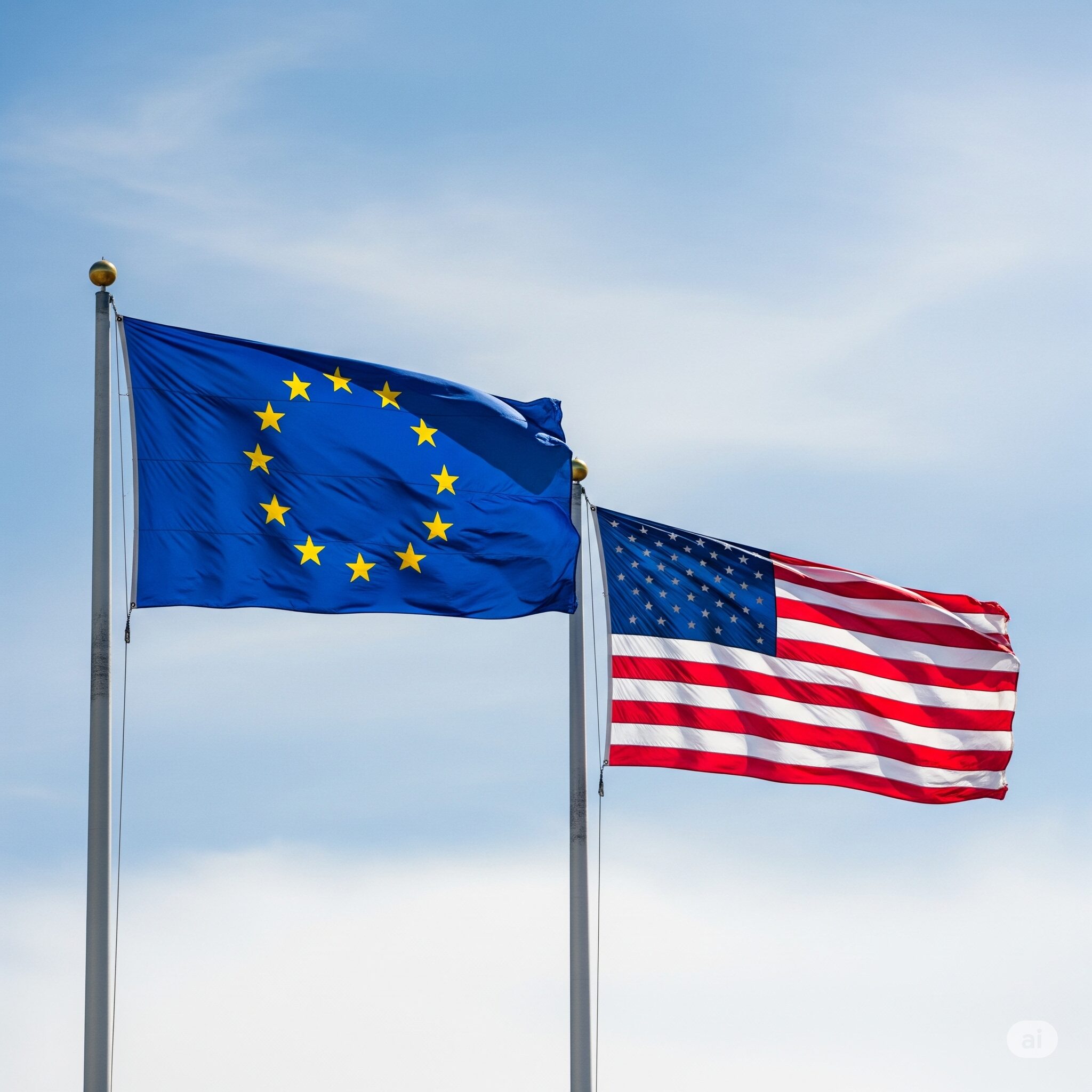Meta Description: Explore the 2025 Trump-EU Trade Deal with $750B in energy sales, $600B in investments, and 15% tariffs. Learn its global impact now!
In a stunning turn of events, the 2025 Trump-EU Trade Deal has taken the global stage by storm, marking a pivotal moment in U.S.-European Union relations. Announced on July 27, 2025, this trade deal showcases U.S. President Donald Trump’s aggressive negotiation tactics, securing $750 billion in U.S. energy sales, $600 billion in EU investments, zero-tariff access for American goods, and a flat 15% auto tariff. As the world watches, this trade deal is poised to reshape economic landscapes and spark debates across continents. Let’s dive into the details and implications of this historic agreement.
What is the 2025 Trump-EU Trade Deal?
The 2025 Trump-EU Trade Deal emerged from intense negotiations between President Trump and European Commission President Ursula von der Leyen. According to recent reports from CNBC and BBC News, the deal averts a potential trade conflict that could have imposed 30% tariffs by August 1, 2025. Instead, it establishes a 15% tariff rate, providing a balanced yet challenging framework for both sides.
Key Components
- $750 Billion in U.S. Energy Sales: This massive influx strengthens America’s energy sector and reduces Europe’s reliance on other global suppliers.
- $600 Billion in EU Investments: European companies are set to pour capital into U.S. markets, boosting job creation and infrastructure.
- Zero-Tariff Access for American Goods: U.S. exporters gain a significant advantage in the EU market.
- 15% Auto Tariff: A reciprocal measure that levels the playing field for U.S. automakers.
European leaders, including Germany’s Chancellor Friedrich Merz, have acknowledged the deal’s role in preventing a trade war that could have hit export-driven economies hard. Yet, the agreement has sparked mixed reactions, with some calling it a “disaster” and others a “triumph.”
The Negotiation Process: Trump’s Masterstroke
The negotiation process behind the 2025 Trump-EU Trade Deal has been described as anything but conventional. As noted by an ambassador in the Financial Times, Trump “worked out exactly where our pain threshold is,” suggesting a strategic approach that leveraged U.S. economic leverage. The deal, finalized after “tough negotiations” in Scotland, reflects Trump’s oft-touted “Art of the Deal” philosophy, a strategy that has now extended to international trade.
European Commission President von der Leyen admitted the deal addresses America’s “imbalance,” a nod to long-standing U.S. complaints about EU trade practices, including fines on tech giants like Google. This acknowledgment underscores the one-sided nature of the agreement, which has left some European leaders, like former Belgian PM Guy Verhofstadt, fuming over the lack of concessions from the American side.
Impact on Global Economies
The 2025 Trump-EU Trade Deal is set to have far-reaching effects on global economies. For the U.S., the deal promises a boost in energy exports and job growth, aligning with Trump’s “America First” agenda. The $600 billion in EU investments could revitalize key industries, from manufacturing to technology.
For the EU, the deal offers access to American markets but comes with the challenge of adjusting to the 15% tariff. Italy’s Prime Minister Giorgia Meloni has expressed cautious optimism, awaiting full details, while Germany’s export sector breathes a sigh of relief. Globally, this trade deal could set a precedent for negotiations with major U.S. trade partners like Mexico, Canada, and China.
Media Reactions: A Tale of Two Narratives
Media coverage of the 2025 Trump-EU Trade Deal highlights a stark divide. European press, including outlets like the Financial Times, has praised Trump’s negotiation skills, with some calling it a “juggernaut” victory. In contrast, U.S. media outlets are anticipated to focus on perceived shortcomings, with JD Vance predicting sarcastic headlines like “Donald Trump Only Got 99.9 Percent of What He Asked For.”
This discrepancy aligns with data from the Reuters Institute (2023), which found 65% of U.S. news coverage of Trump’s policies carries a negative slant, compared to 40% in Europe. The polarization reflects cultural biases and political agendas, making the trade deal a lightning rod for debate.
Future Outlook: What Lies Ahead?
As of 10:30 PM EDT on July 27, 2025, the full terms of the trade deal remain under wraps, fueling speculation. Analysts suggest that the success of this deal could encourage Trump to pursue similar agreements with other nations, potentially stabilizing global trade amid uncertainties. However, challenges remain, including public disclosure of terms and the deal’s long-term economic impact.
For businesses and consumers, the trade deal signals both opportunities and adjustments. Stay tuned as more details emerge, and let us know your thoughts in the comments below!
Conclusion
The 2025 Trump-EU Trade Deal stands as a testament to bold diplomacy and economic strategy. With $750 billion in energy sales, $600 billion in investments, and a redefined tariff structure, this trade deal is a cornerstone of Trump’s legacy. Whether it’s hailed as a triumph or critiqued as imbalanced, its effects will resonate for years to come. Bookmark this page for updates on this evolving story!
Sources:
- CNBC. (2025, July 27). Trump and EU’s von der Leyen announce trade deal. Retrieved from https://www.cnbc.com
- BBC News. (2025, July 27). EU and US agree trade deal, with 15% tariffs for European exports to America. Retrieved from https://www.bbc.com
- Financial Times. (2025, July 23). US and EU close in on 15% tariff deal. Retrieved from https://www.ft.com
- Reuters Institute. (2023). Media Bias in Political Coverage. Retrieved from https://reutersinstitute.politics.ox.ac.uk







Leave a Reply